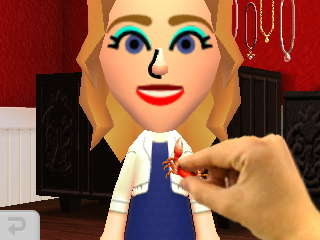Tomodachi Life Review
A cross between The Sims, Animal Crossing, and the stranger parts of otaku culture, Tomodachi Life is a game that's unashamedly Japanese. At times it's hilarious; at other times it's utterly bewildering. Your animated collection of Miis need to be fed and watered, and their wants for the finer things in their virtual lives satisfied. They cry out to be played with in wonderfully odd minigames, and update you with the latest happenings on their island home from behind a suitably cheesy news desk. Tomodachi Life is the Tamagotchi all grown up. But, like that piece of '90s virtual pet nostalgia, it wasn't enough to keep me entertained once the novelty wore off.
Still, Tomodachi Life is quite the wacky novelty while it lasts, particularly if you're populating your virtual island with friends and family from your own life--or, in my case, members of the GameSpot UK crew. You can create some eerily recognizable caricatures of your chums using the standard Mii creation tools, along with the new customizable voices for the game's text-to-speech engine. Granted, the text-to-speech engine isn't the most flattering, but its slightly robotic qualities add to the kitsch charm of the game. Likewise, a set of assignable attributes, such as how much energy your Miis have or how serious or light their moods are, add personality and generate a specific profile for each one. That profile isn't just for show, either. Likes, dislikes, how needy they are, how often they need to be fed, and their compatibility with other Miis are all linked into each character's personality profile.
Disappointingly, that same level of customization doesn't apply to the island itself, which is built up automatically--not that you don't already have your hands full. Needy Miis cry out for food as soon as they've set foot in their shared apartment block, while others demand new clothes, or a new premade look for their bare home. Shops scattered around the island are stocked with an eclectic range of cuisines and items from the familiar to the downright bizarre to spoil your Miis with. Edibles like spaghetti Bolognese from Italy, roast beef from England, and beef bourguignon from France--complete with quirky real-life pictures--make up the cuisine, while checked shirts, summer dresses, and more esoteric items like ice cream hats and firefighter uniforms make up the outfits.
There's lots of fun to be had dressing up your friends in the most absurd outfits and watching their faces wince as they fail to appreciate the stylistic pleasures of a "harem pants and giant strawberry hat" combo. But while these crimes against fashion certainly raise a smile, ultimately you need to keep your Miis happy. Stick them in an unflattering outfit or feed them an unappetizing stuffed cabbage roll one too many times, and their happiness rating, and the money they give you as a reward, takes a hit. It's a simplistic system, and outside of receiving gifts like Wii U consoles, frying pans, and incredibly cheesy songs to sing inside the island's concert hall (complete with customizable lyrics), your characters barely develop as they level up. As you discover, though, an unhappy islander is not a productive one, particularly when it comes to making friends and developing relationships.

Tomodachi Life revolves around relationships, be they romantic or otherwise. Happy islanders ask to make friends, want to introduce people, or declare their undying love for a friend with alarming regularity. They don't always hit it off, particularly if you give them bad advice in the small-talk department, but once friends, they're often at each other's apartment hanging out. You do have the option of telling a Mii not to make friends with another, but expect the dark rain clouds of depression to be (literally) floating over their heads while they get over it. As reported by GameSpot, Miis of the same sex can be friends, but they can never fall in love or go on to propose via a strange but amusing minigame where you have to tap your romantic spiel out in time to the thought bubbles of your partner.
Hammering the heterosexual point home is the ranking board, which displays the vital stats of your islanders, including the most popular and most pampered, and, yes, how desirable your female inhabitants are to the boys. At least Nintendo has gone on the record to say that if the game gets a sequel, it'll be more inclusive. Still, it's hard to take these inclusions and omissions too seriously when attached to a game as absurd as this one, even if Nintendo should do better.

Once you've got your Miis married off, populating your island with children or gifting items to other islands via StreetPass, there's not a whole lot else to do. The rankings, experience points, and your Miis development (or rather, lack of it) simply aren't deep enough to hold your attention for long. There are plenty of amusing moments, like the cringe-worthy rap battles that happen by the island's fountain, or the minigames that have you picking baby crabs off a Mii with a disembodied human hand and playing a facsimile of an old-school Japanese role-playing game, but these are one-shot deals in the humor department; once you've seen them, the charm soon wears off.
What you're left with is a sophisticated Tamagotchi, and a repetitive cycle of feeding, nursing, and entertaining that is hardly the most absorbing of pastimes. A much deeper system of development for Miis would have gone a long way towards keeping things interesting. That said, there are so many hilarious and curiously bizarre moments to be found along the way that even if the journey to fully fledged family life is a short one before the repetition sets in, it's well worth the trip.









